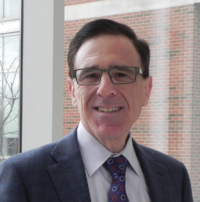April 1, 2017:
Investigator Spotlight
Lawrence Feldman, MD

Educational Background: MD from University of Michigan
Research Interests: Dr. Feldman’s research interests lie in finding the optimal treatments to improve the response, survival rates, and quality of life in the treatment of lung and head and neck cancers. He is the UIC Principal Investigator on several studies that test the role of targeted agents in the treatment of lung and head and neck cancer. He is also interested in the application of large databases to answer critical clinical questions in the management of these malignancies.
Fun Facts: He is a “gym rat” and loves the game of basketball.
His father was a family practice physician and used to make house calls.
He and his wife have 2 grown sons and 2 dogs (cocker spaniels).
Thought Leader Perspectives
Robert Winn, MD, director, University of Illinois Cancer Center; associate vice chancellor for community based practice

At the UI Cancer Center, we pride ourselves on our commitment to the underserved and the community. Our research and care programs are designed to reflect on the disparities that our patient populations face. We seek to know why certain populations face higher incidence and mortality rates, and to identify the barriers to prevention, screening and treatment. We acknowledge the dearth of inclusive research which has prevented us from fully understanding the impact of disease on different racial and ethnic populations, which face distinct risk factors. We have taken an active role in Diversity in Clinical Trials and the #BeaGift campaign to encourage greater inclusivity, but we know that there’s more to do.
When President Obama launched the All of Us℠ Research Program (previously known as the Precision Medicine Initiative), we recognized that this would be a unique opportunity to focus on the need to diversify clinical trials and medical research on a larger scale than ever before possible. The Illinois Precision Medicine Consortium (IPMC) received one of four initial grants under this ambitious and visionary initiative. We are grateful for the opportunity to collaborate with our partners in the IPMC and engage in this groundbreaking work.
The All of Us℠ Research Program has the goal of enrolling more than one million patient volunteers in different regions of the United States, to donate their time, biospecimens, and medical records, to create a diverse biorepository that will enable researchers to gain a better understanding of not only the origins of disease, but also how genetic and lifestyle variances may impact different patient populations. From this initiative, we hope to discover new biomarkers, more accurately estimate disease risk, understand and develop solutions to health disparities, further the construct of targeted therapies, and inspire and educate study participants by providing them with the tools and technologies to advance their own health. These are bold objectives, and we embrace the challenge. We are hopeful that the aggregated data from All of Us℠ Research Program will help us find the answers we need to effectively address the healthcare disparities that have plagued our patient populations.
The UI Cancer Center is fortunate to share in this effort with our Big Ten CRC cohort, Northwestern University, and the University of Chicago, as well as the other institutions and medical centers that will be facilitating this initiative. I highlight this collaboration because the All of Us℠ Research Program is an intentional effort to recognize the diversity of our national population. I believe that it will make our research more effective and will lay the foundation for the future of our nation’s medical research. Participation in the All of Us℠ opportunity also includes our national FQHC’s and Veterans Affairs Medical Centers, both of whom receive generous populations and are also challenged with routes to clinical trials.
We often say that our zip codes are as influential, if not more influential, than our genetic codes in determining health outcomes. As we work within this reality, we look forward to what the All of Us℠ Research Program will do to advance more effective clinical trials and their benefit to the patient populations historically ignored by research. In our efforts to make a difference in their lives, we at the UI Cancer Center are privileged and humbled to serve.
About the Big Ten Cancer Research Consortium: The Big Ten Cancer Research Consortium was created in 2013 to transform the conduct of cancer research through collaborative, hypothesis-driven, highly translational oncology trials that leverage the scientific and clinical expertise of Big Ten universities. The goal of the Big Ten Cancer Research Consortium is to create a unique team-research culture to drive science rapidly from ideas to new approaches to cancer treatment. Within this innovative environment, today’s research leaders collaborate with and mentor the research leaders of tomorrow with the unified goal of improving the lives of all patients with cancer.
About the Big Ten Conference: The Big Ten Conference is an association of world-class universities whose member institutions share a common mission of research, graduate, professional and undergraduate teaching and public service. Founded in 1896, the Big Ten has sustained a comprehensive set of shared practices and policies that enforce the priority of academics in the lives of students competing in intercollegiate athletics and emphasize the values of integrity, fairness and competitiveness. The broad-based programs of the 14 Big Ten institutions will provide over $200 million in direct financial support to almost 9,500 students for more than 11,000 participation opportunities on 350 teams in 42 different sports. The Big Ten sponsors 28 official conference sports, 14 for men and 14 for women, including the addition of men’s ice hockey and men’s and women’s lacrosse since 2013. For more information, visit www.bigten.org.














Subscribe to the Big Ten CRC Newsletter X
X Facebook
Facebook YouTube
YouTube